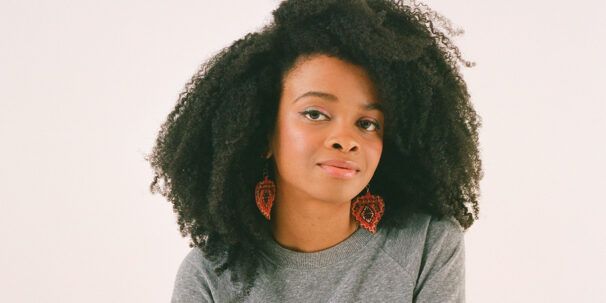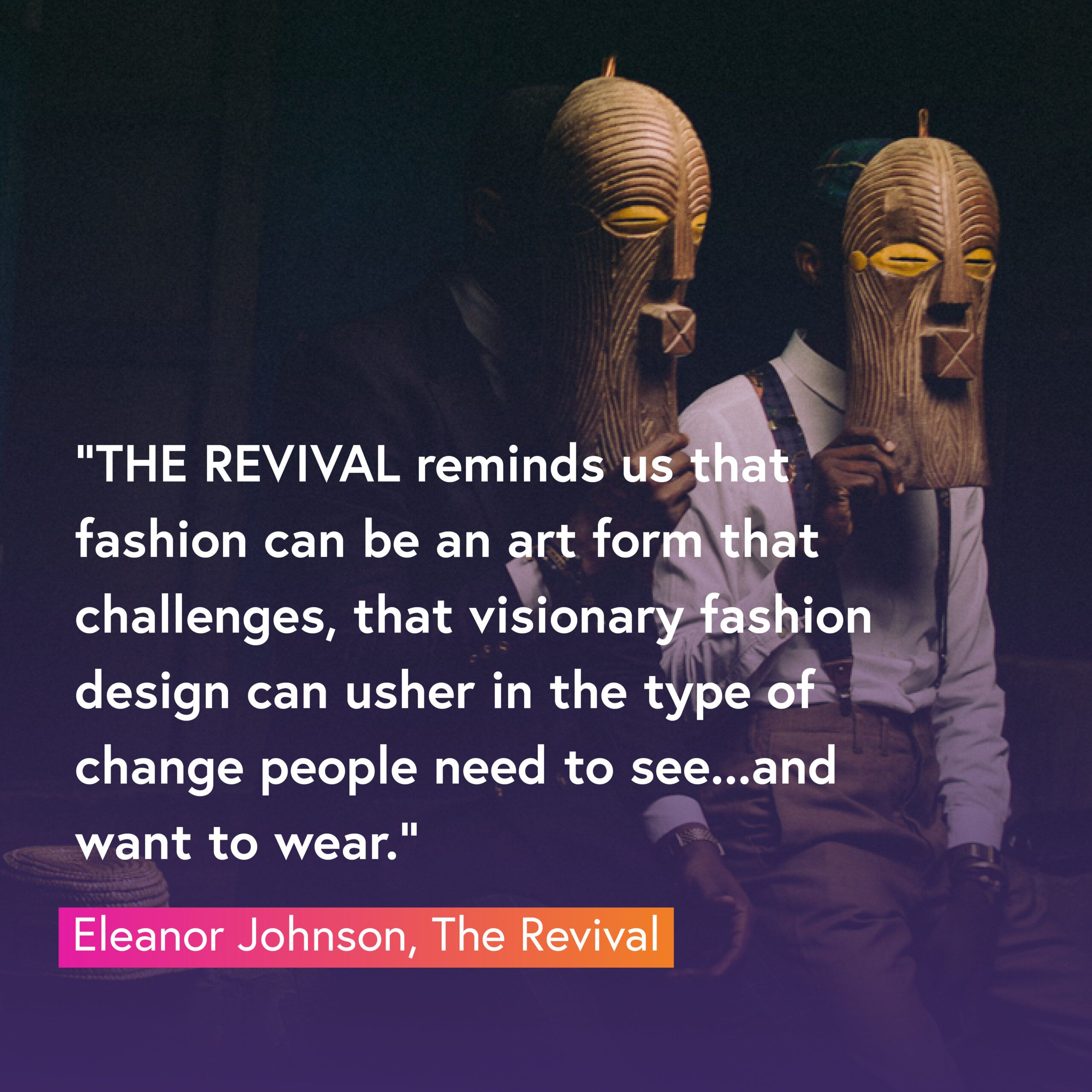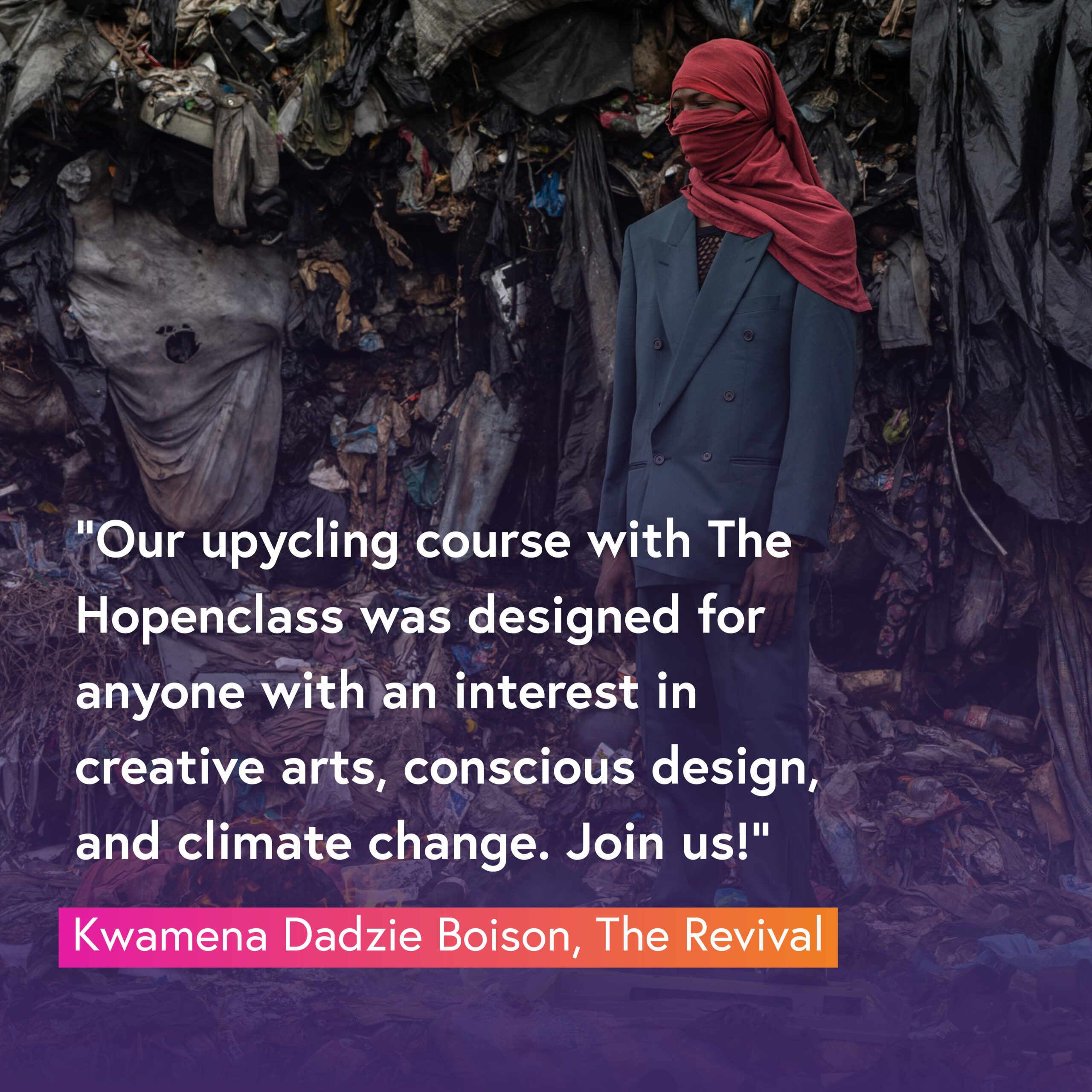In conversation with Maya Penn: Conscious design, collective change and the power of art
We spoke to Maya Penn about her upcoming animated short, her fashion brand, activism, and her work on our Upcycling and the Circular Economy course with THE REVIVAL and The Hopenclass.

By Rhiannon Wardle
Discussions around sustainable fashion are becoming more commonplace as the fast fashion industry continues to be called out for its wasteful, unethical and trend-obsessed business practices. Education plays an important role in this – in order for people to change their mindsets about fashion, they need to be aware of the sustainable and accessible alternatives available.
That’s why we collaborated with THE REVIVAL, The Hopenclass and Maya Penn on their Upcycling and the Circular Economy: Ghanaian Creative Solutions to Global Textile Waste course, exploring creative textile waste solutions and the benefits of a circular economy. THE REVIVAL is a community-led, upcycling design non-profit in Ghana, and FutureLearn is proud to join forces with The Hopenclass to introduce THE REVIVAL’s work to our global community of learners.
We interviewed Maya Penn, a 22-year-old activist, sustainable fashion designer, animator, entrepreneur and TED talk speaker, to get her insight on how to inspire positive action and the role of collective change in the fashion industry. She also revealed the inspiration for her upcoming animated short film centred around environmentalism.
Interview with Maya Penn, founder of Maya’s Ideas and board member for THE REVIVAL
We’ve heard the exciting news that your original animated short, ‘ASALI: Power of the Pollinators’, is going to be produced by award-winning actress, Viola Davis. Can you talk a bit about what inspired this story and what you hope it will achieve?
I originally created ‘ASALI: Power of The Pollinators’ when I was 11 years old. I premiered the concept for it that I animated when I was 12 during my TEDWomen 2013 Talk. That talk went viral worldwide and was translated into 38 different languages.
To this day I get flooded with emails, DM’s, and fan art from people who want to see more of these characters and this world. I’ve been animating since I started making flip books when I was 4 years old, and my passion for both animation and sustainability goes deep.
I hope to create a piece of media that’s a good, character-driven story first, that also brings a breath of fresh air to how environmental topics are handled in media.
You’ve said that animation is one of your biggest passions – are there any animated films or shows that inspired you to create your own environment-focused animations?
As far as the environmental themes go, I was mostly inspired by my work as a youth environmental activist, my environmental education work, speaking at schools, and hearing what other young people felt about how these issues impact the natural world and our communities.
Animation is a favourite medium of mine, and one that is so flexible and universal, so it made sense that these two passions would eventually combine.
Inspiring positive action is a big focus for you, as seen from your non-profit, Maya’s Ideas 4 The Planet. What do you think is the best way to inspire people to take action after they’ve been made aware of an issue? I know a lot of people struggle to take that next step.
Sometimes, people feel intimidated when they see how long I’ve been in the space, and how large scale of an issue climate change, for example, is. This is why I emphasise letting people know that they already belong in this movement, no matter who they are or their expertise.
This is an issue that affects every single one of us on some level. I often let people know that whatever it is in their life that they’re already passionate about: art, cooking, fashion, music, travel, writing — literally anything can be a vehicle for positive impact.
There is a beautiful thing about how interconnected environmental issues are with every aspect of human life: you don’t have to step that far outside of yourself to make a change.


Young people, like yourself, are often said to be leading the way when it comes to climate action and conversations around sustainability. What do you think we can do to help older generations listen, or do you think that it’s more important to focus on future generations?
I feel like a lot of people from older generations have already been listening and teaching. Especially in Black, indigenous, and other communities around the world, in both the Global North and Global South. Every generation or community may not use the exact same language and terminology, but sustainable practices existed before sustainability was even a word.
I know I stand on the shoulders of many generations of environmental activists and eco-conscious change makers who paved the way for voices like mine to be heard, which is why intergenerational collaboration is more important now than ever.
You have a sustainable fashion brand, Maya’s Ideas. What inspired you to work in sustainable fashion at such a young age?
I founded Maya’s Ideas in 2008 at 8 years old, out of a passion for art and design and a drive to tackle the negative impact the fashion industry has on the environment. I grew up in an eco-conscious household and understood the impacts various industries had on the earth.
Out of curiosity, I did some research on the fashion industry, and it snowballed from there. At the time, sustainable fashion was nowhere near a mainstream topic, so I did a lot of work to bring awareness to the issue through my brand.
I literally started by creating my items from fabric remnants and vintage clothing I had around the house. Today, Maya’s Ideas is an award-winning global brand creating artisan-crafted accessories and clothing made from organic, recycled, and vintage materials.
We’re proud to say you’re an educator on our new course, Upcycling and the Circular Economy: Ghanaian Creative Solutions to Global Textile Waste by The Hopenclass and THE REVIVAL. What inspired you to get involved with THE REVIVAL?
THE REVIVAL embodies everything that has been at the heart of my own journey: protecting nature, protecting culture, spotlighting the impact of overconsumption, using art as a force for good, and uplifting voices across the diaspora – all while being community-driven, which is one of the most crucial aspects of this organisation.
I am immensely honoured to be a board member of THE REVIVAL and to be an educator on this engaging and inspiring course with The Hopenclass and FutureLearn!

What do you hope people will take away from this course when it comes to fashion consumption, upcycling, and how to create collective change?
I hope learners come away with a newfound understanding of not only the impact of the fast fashion industry but the ways in which we can connect back to our creative roots to foster collective impact through the art of design; to reimagine what is deemed as fashion waste and extend the lifecycle of what we wear, while encouraging others to do the same.
Develop your own creative upcycling ideas today
If you’re interested in learning more about sustainable fashion and how to take action in your community, join our Upcycling and the Circular Economy course. With plenty of inspirational ideas from the collective change in Ghana, you’ll soon come up with your own localised solutions to fashion waste management and transformation.
If you’re unfamiliar with the concept of upcycling, it describes the creative transformation of waste or byproducts into new, high-quality products, therefore giving them a second life.

Learn even more about sustainable fashion
Has your interest been sparked? We have online courses covering many different topics within sustainable fashion, so you can continue your learning journey beyond THE REVIVAL’s inspiring upcycling course.
- Africa to the World: Analysing the Global Appeal for African Luxury Fashion by The Hopenclass and Moshions
- Fashion Sustainability: Shaping Fashion’s Future by Institut Français de la Mode
- Fashion Management: Create Your Own Sustainable Brand by Institut Français de la Mode
- Compassion in Fashion: Sustainability and the Global Fur Trade by ACTAsia
- Fashion and Sustainability: Understanding Luxury Fashion in a Changing World by UAL: London College of Fashion
- Sustainable Fashion: Current Systems and the Future of Fashion by Parsons School of Design
- Fashion and the Climate Crisis: An Introduction to Sustainability by The Sustainable Angle
You can also read our other articles about sustainability in the fashion industry, the best sustainable fabrics, and the future of fashion technology. With your newfound knowledge, you’ll be better equipped to start making a difference in your community, and maybe, like Maya, beyond.








